Expert Interviews
- University Reviews
- Career Guide
 Video Counseling
Video CounselingImportant Facts
- Ask any Question - CV Forum

Business Communication: What It Is, Types and Importance
College Vidya Team Jan 11, 2025 6.3K Reads

In the fast-paced, digital world of today, where businesses are connected, communication is crucial to maintaining a profitable business. One might not be capable of delivering to the customers what they genuinely want to give them without an excellent communication plan.
Effective communication enables businesses to connect with their employees, customers, stakeholders, and other businesses to exchange information, ideas, and opinions. Business communication is a specialized form of communication that focuses on achieving specific goals related to business operations. In this blog post, we will explore what business communication is, and why it is important.
What is Business Communication?
Business communication is the method through which a company achieves its specific objectives by exchanging information between its personnel and those present outside the company. There can be internal communication that occurs within an organization between the employees and the management or there can be external communication that occurs between the organization and its shareholders, customers, etc.
Making sure that everyone connected to the organization has a clear understanding of its objectives and what it hopes to accomplish shortly is the purpose of maintaining effective business communication.
|
Online Degree Course that will Increase Your Business Communication Skills |
|
| Online MBA Business Degree Courses | Online MBA for Working Professionals |
| Global MBA Online | MBA Distance Education |
Various scholars and authors have given several definitions of business communication, let us take a look at that-
- In the opinion of Curtis, “Business communication is a communication made within a business organization to solve problems and make decisions.”
- Ricks and Gow stated that “Business Communication is a system that is responsible for affecting change throughout the whole organization.”
- Elihu Katz has defined that “Business communication is an exchange of ideas, messages, and concepts related to achieving a series of commercial goals.”
In all, business communication is a method by which an organization can accomplish its business objectives. Without it, there is a greater chance that mistakes will be made and there may be disagreements among those involved with the business.
Video Source: DWIVEDI GUIDANCE
Types of Business Communication
There are mainly 3 types of business communication that are majorly used in the modern workplace. These are
|
Types of Business Communication |
|
|
Internal Business Communication
|
External Business Communication |
| Lateral Business Communication |
- |
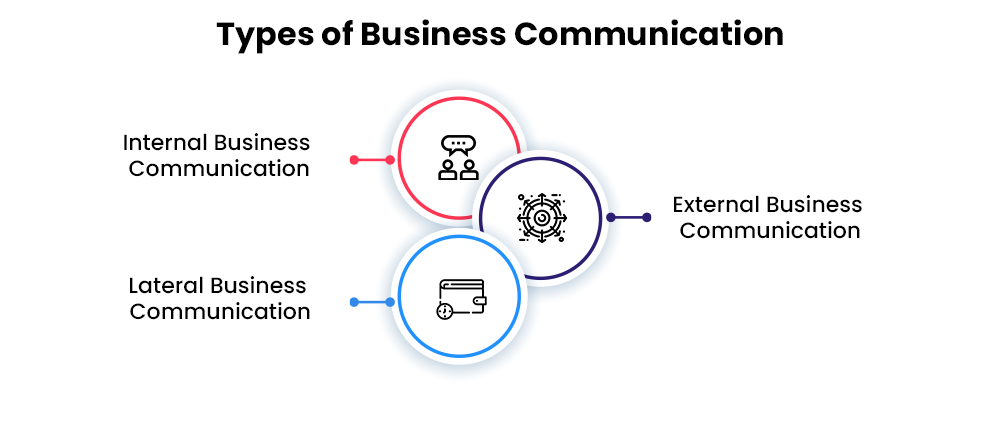
Internal Business Communication
The exchange of knowledge, concepts, and messages within a company is referred to as internal business communication. There are both formal and informal ways to facilitate internal communication within a business organization. Emails, memos, meetings, and chat platforms are just a few of the different ways that this kind of communication can be carried out.
For an organization to run well, there must be effective internal business communication since it promotes teamwork and the setting of clear goals and duties. Additionally, it promotes employee engagement and motivation, aids in creating a strong company culture, and facilitates information exchange.
Organizations can increase productivity, improve decision-making, and accomplish their overarching business goals by using effective internal communication methods.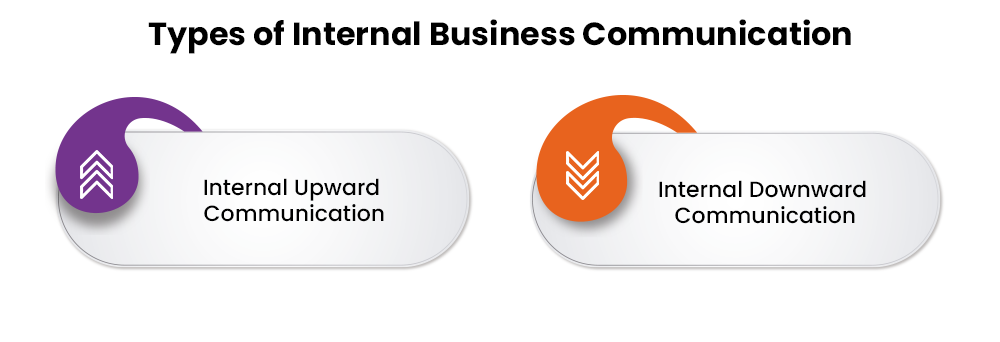
Internal business communication is further divided into two sub-categories that are:
1) Internal Upward Communication
- The flow of information or feedback from lower-level employees or departments to their immediate supervisors, managers, or higher-level executives is referred to as internal upward communication.
- All organization needs this kind of communication because it enables workers to talk to their managers about their concerns, ideas, and proposals. In the long run, it promotes better decision-making and problem-solving by fostering a culture of openness, trust, and accountability.
- Examples of internal upward communication include employee surveys, suggestion boxes, regular team meetings, and one-on-one discussions with managers or supervisors.
2) Internal Downward Communication
- The flow of information and messages from higher-level management to their team and employees within an organization is referred to as internal downward communication.
- Internal downward communication is a vital component of organizational communication since it assists in making sure that staff members are aware of their responsibilities and goals.
- Also, it can give employees insightful feedback on how they performed, which they can use to develop their abilities and feel more satisfied at work.
- Examples of internal downward communication include regular team meetings, performance evaluations, memos, and directives from upper management.
External Business Communication
The exchange of information and messages between an organization and individuals or groups outside the organization is referred to as external business communication. This type of business communication is generally done to increase the chances of more business opportunities. This communication can take many forms, such as emails, phone calls, letters, social media posts, and press releases.
This external business communication is essential for expanding a company's horizons and building and maintaining relationships with its current shareholders, which include clients, suppliers, investors, and others.
Organizations that use effective external communication are better able to promote their goods and services, respond to customer feedback and issues, and adhere to legal and regulatory obligations.
Lateral Business Communication
The exchange of information, ideas, and messages between individuals who hold the same level or position within a company or organization is referred to as lateral business communication. To put it another way, it refers to communication that takes place among peers or coworkers who have similar tasks or responsibilities inside a corporation.
There are several ways to communicate laterally, including phone calls, emails, instant messages, and face-to-face interactions. It is crucial to good teamwork and cooperation since it allows workers to collaborate on tasks, share knowledge, and solve problems.
Some examples of lateral communication in a business setting might include a team meeting where colleagues discuss a project, a departmental email chain to brainstorm ideas or an informal chat between coworkers at the lunch. Lateral communication can also occur across different departments or functional areas or individuals holding the same position within a company.
Top Trending MBA Specialization
Why is Business Communication Important?
In the above paragraphs, we have clearly understood what business communication is but now let’s understand why is it so important in the business world. Here are some reasons why business communication is important: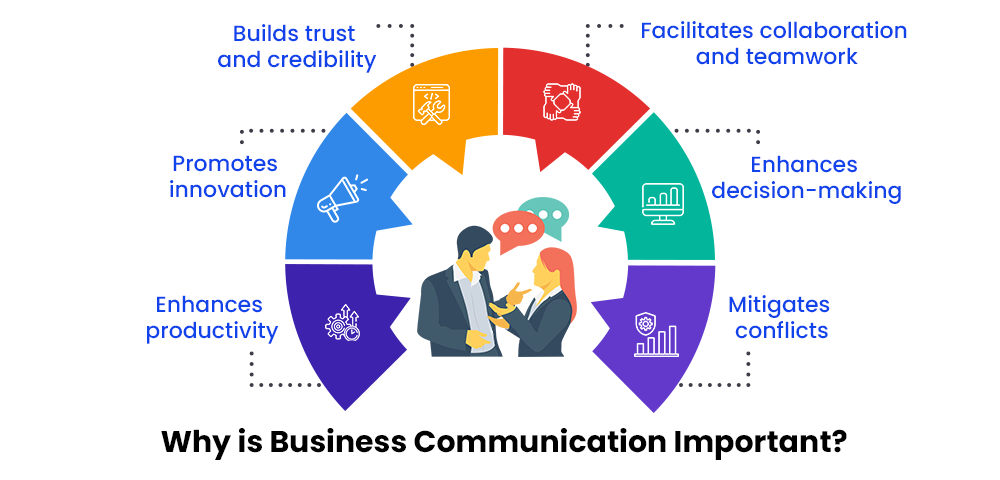
- Facilitates collaboration and teamwork: One can accomplish their business goals with good business communication within their corporation. Because it encourages teamwork and raises everyone's spirits. A clear understanding of an organization's aims and objectives is aided through business communication. And this precise understanding makes it easier for the team to strive toward it.
- Builds trust and credibility: Establishing trustworthy relationships with stakeholders, clients, and employees is facilitated by business communication. One can win the confidence of other parties involved in the business with a clear and open communication channel.
- Enhances productivity: Good business communication techniques aid in reducing misinterpretations, outlining expectations, and minimizing errors, all of which can boost productivity. One can quickly correct mistakes at the beginning of production and deal with them oneself if there is a communication line at every level of management, which lowers the likelihood of a serious issue.
- Promotes innovation: Open lines of communication among staff members foster creativity and ongoing improvement by encouraging the exchange of ideas and perspectives. A company can improve its product with the support of team meetings, ongoing feedback, etc. Also, it decreases employee hesitation and encourages them to put themselves forward and propose their ideas to the management. Also, it creates a sense of confidence that an employee's ideas will be taken into account no matter their position.
- Enhances decision-making: Managers and leaders who communicate effectively can base their decisions on accurate information and input from stakeholders to further enhance their products, expand their consumer base, and maintain the confidence of all stakeholders.
- Mitigates conflicts: Conflicts at work can be avoided or resolved with clear communication. Effective corporate communication within a team can promote not only efficient teamwork but also more openness and cooperation between teammates.
We can conclude that business communication is crucial to the success of any organization. By fostering collaboration, building trust, enhancing productivity, improving customer relationships, promoting innovation, enhancing decision-making, and mitigating conflicts, effective communication can help organizations achieve their goals and objectives.
Trending Short-Term Online Certificate and Diploma Courses
| Short-Term Online Certificate and Diploma Courses | |
| Certificate Courses Online | Online Diploma Courses |
| Online Certificate In Corporate Communication | Online Diploma In International Trade Management |
| Online Certificate In Project Management | Online Diploma In HR Management |
7 C’s of Effective Business Communication
The 7 C's of Effective Business Communication are a set of principles that can help one communicate clearly and effectively in a business context. These principles are:
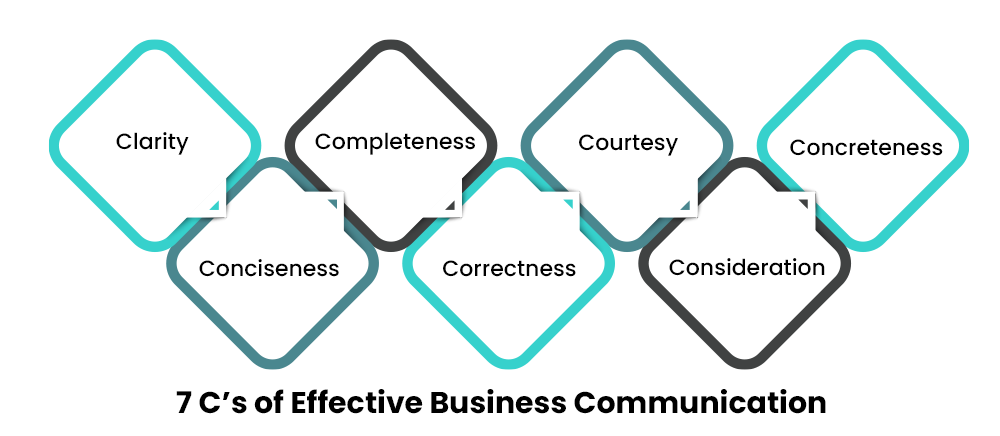
- Clarity: Clear communication is essential for effective business communication. One needs to ensure that their message is easy to understand and that they are communicating in a way that is clear and concise. One must avoid using jargon or technical terms that their audience may not be familiar with. One should make sure that their message is focused and to the point.
- Conciseness: Being concise means communicating their message in as few words as possible, without sacrificing clarity. One needs to get to the point quickly and avoid unnecessary details. One should use simple language and avoid long, complex sentences.
- Completeness: One should ensure that their message is complete and covers all the necessary information that their audience needs to know. One should avoid leaving out important details or assuming that their audience already knows everything they are talking about.
- Correctness: Accuracy is crucial in business communication. One must ensure that their message is factually correct and free from errors in grammar, spelling, or punctuation. If their message contains incorrect information, it can damage one’s credibility and reputation.
- Courtesy: Politeness and courtesy are essential in business communication. One should consider using a friendly tone and showing respect for their audience. They should avoid using language that is offensive or disrespectful.
- Consideration: Consideration means taking into account the needs and expectations of their audience. One must give thought to what their audience wants to know, what their concerns are, and how they will react to their message. One should tailor their message accordingly.
- Concreteness: Concreteness means communicating their message in a specific and tangible way. One could use examples, statistics, and other concrete details to support their message and make it more convincing. They should avoid vague or abstract language that can be difficult to understand.
In short, the 7 C's of Effective Business Communication are Clarity, Conciseness, Completeness, Correctness, Courtesy, Consideration, and Concreteness. By following these principles, one can communicate more effectively, build better relationships with their audience, and achieve their business goals. Also Read: 7 Ps of Marketing!
Business Communication Strategies
The terms methods, techniques, and approaches used to communicate successfully in a business setting are referred to as business communication strategies. Businesses need effective communication to compete in the market, maintain relationships with stakeholders, and accomplish their objectives. These are some important strategies to take into account:
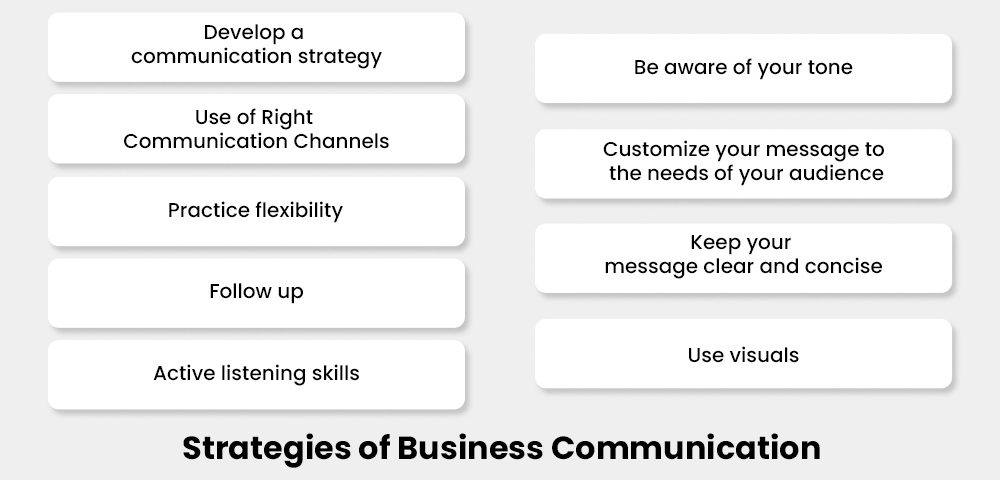
- Develop a communication strategy: A strategy outlines the objectives, the target audience, the message, and the channels for communication. It ensures that communication is reliable, focused, and efficient.
- Use the right channels for communication: Various audiences and message types require different platforms. Depending on the circumstance, think about using email, phone, video conferencing, or face-to-face contact.
- Practice flexibility: Be prepared to change your communication style in response to criticism or evolving situations. You can get greater results by using a flexible approach.
- Follow up: After a communication, follow up to make sure your message was received and understood. By doing this, confusion and misconceptions may be reduced.
- Active listening skills: Actively hearing what others have to say is just as important as speaking. Pay attention to what others are saying, show interest by asking questions, and be attentive.
- Be aware of your tone: In business communications, tone is crucial. It ought to be respectful, polite, and professional. Avoid using humor or sarcasm that could be taken incorrectly.
- Customize your message to the needs of your audience: You can effectively deliver your message by being aware of the needs, preferences, and communication styles of your audience. Utilize words and illustrations that they can relate to.
- Keep your message clear and concise: Use simpler, clear, and concise wording to avoid any confusion. Avoid unnecessary information and concentrate on the important themes.
- Use visuals: Graphs, charts, and images can all be used to effectively communicate complex information.
Effective Business Communication Examples
There are various examples of ways to communicate effectively in a business setting. These are:
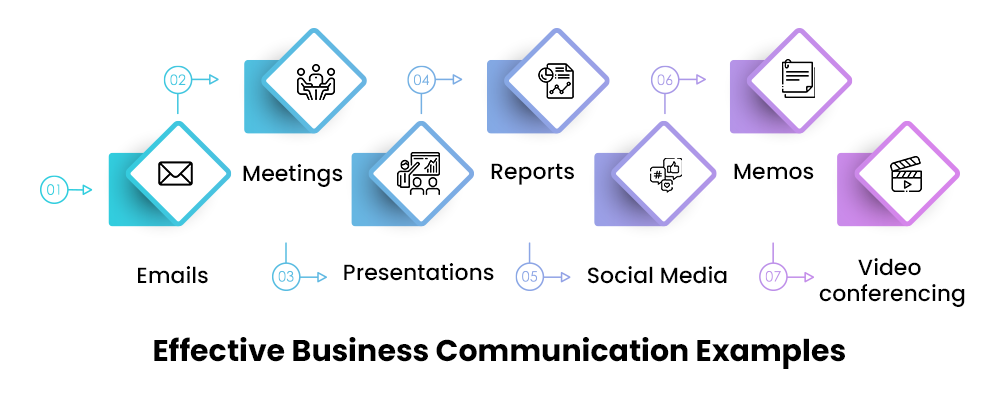
- Emails: One of the most common and effective ways to communicate in business is through email. Emails are convenient, and fast, and allow for clear and concise communication. Whether you are sending an important memo or simply following up on a task, emails are a great way to communicate with your colleagues, clients, or customers.
- Meetings: Face-to-face meetings are essential in business communication. Meetings provide an opportunity for team members to collaborate, share ideas, and provide feedback. Meetings can take place in person or virtually, and both have their benefits. In-person meetings allow for more personal interaction, while virtual meetings are more efficient and can be conducted from anywhere.
- Presentations: These are an effective way to communicate information to a large group of people. They allow you to convey important information, share data, and provide visuals to support your message. When creating a presentation, it is important to keep your audience in mind and tailor your message to their needs and interests.
- Reports: These are the formal ways of communicating information in business. They can be used to summarize data, provide updates on projects, or share results. Reports should be clear and concise, using charts and graphs to illustrate important information.
- Memos: These are a type of internal communication used to share information within a company. They are typically brief and to the point, providing updates, instructions, or reminders. Memos should be written clearly and professionally and should be sent to the appropriate parties.
- Video conferencing: It has become increasingly popular in recent years, as more businesses have shifted to remote work. Video conferencing allows teams to communicate face-to-face, even if they are in different locations. Video conferencing can be used for meetings, presentations, or one-on-one conversations.
- Social Media: Social media platforms such as Twitter, LinkedIn, and Facebook have become important tools for business communication. They allow companies to connect with customers, share news and updates, and promote their products and services. Social media should be used strategically and in line with the company's brand and messaging.
|
Are you Familiar with Some Popular College Vidya’s Tool? |
|
| Online Age Calculator | One Gallon In Litres |
| EMI Education Loan Calculator | ROI Calculator |
| Meter Feet Calculator | BMI Calculator |
Problems That Effective Business Communication Can Solve
Effective business communication can solve a range of problems that can arise in a business context. Here is a list of some of the problems that effective business communication can solve:
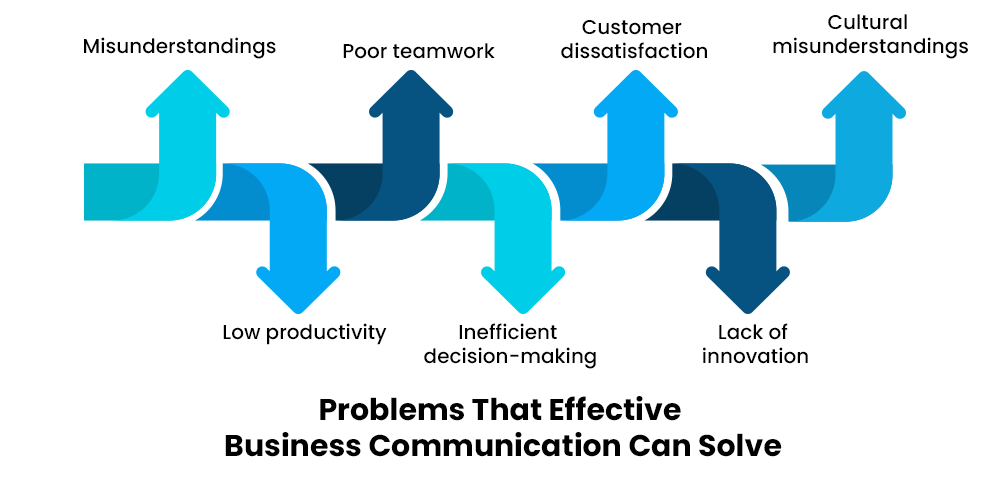
- Misunderstandings: Effective communication can help to prevent misunderstandings that can arise when messages are not conveyed clearly or accurately. This can help to avoid confusion and ensure that everyone is on the same page.
- Low productivity: When communication is unclear or ineffective, it can lead to delays, errors, and missed deadlines, which can reduce productivity. Effective communication can help to streamline processes and ensure that everyone is working efficiently and effectively.
- Poor teamwork: When team members are not communicating effectively, it can lead to conflicts and misunderstandings that can undermine teamwork. Effective communication can help to build stronger relationships and ensure that everyone is working together towards common goals.
- Inefficient decision-making: When communication is poor, it can be difficult to make decisions efficiently and effectively. Effective communication can help to ensure that everyone has the information they need to make informed decisions and that decisions are made in a timely manner.
- Customer dissatisfaction: Poor communication with customers can lead to dissatisfaction and negative reviews. Effective communication can help to build strong relationships with customers and ensure that their needs and expectations are met.
- Lack of innovation: Effective communication can help to foster innovation by encouraging the exchange of ideas and feedback. When team members feel comfortable sharing their ideas and opinions, it can lead to new and innovative solutions.
- Cultural misunderstandings: In today's global economy, effective communication is essential for overcoming cultural differences and ensuring that everyone is working together effectively. Effective communication can help to bridge cultural divides and build strong relationships across borders.
In conclusion, good business communication can help with a variety of issues that might occur in a professional setting, such as miscommunications, low productivity, ineffective teamwork, and dissatisfied clients. By prioritizing effective communication, businesses can build stronger relationships, improve productivity, and drive innovation.
Barriers That Came Across Business Communication
Effective communication is critical to the success of any business. However, several barriers can come across business communication, leading to misunderstandings and breakdowns in communication. Here are some of the most common barriers:
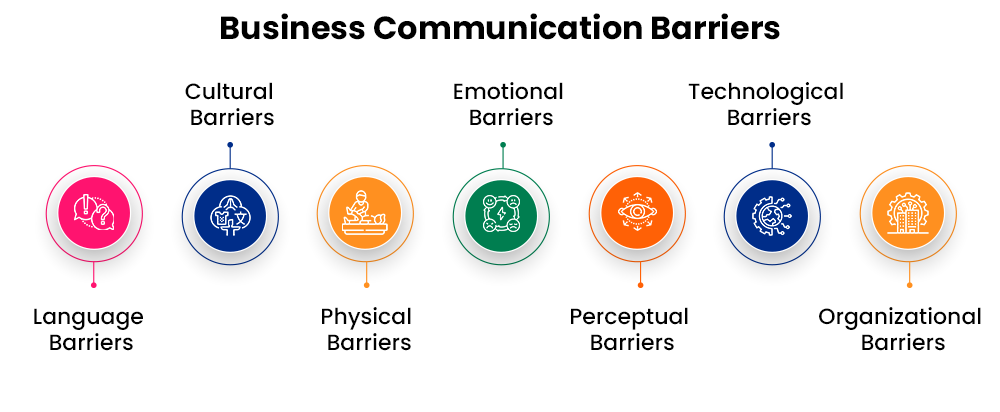
- Language barriers: One of the barriers to effective business communication is language. It can be challenging when two individuals do not speak the same language. It can generally occur when one gets to deal with clients of other countries where the communicating language is different. This can sometimes result in misunderstandings, confusion, and even offense.
- Cultural barriers: Another one on the list is the cultural barriers. Cultural differences can impact communication in significant ways. Different cultures may have different communication styles, body language, and expectations about the level of formality. It is essential to understand cultural differences to communicate effectively otherwise it may lead to issues and problems.
- Physical barriers: Physical constraints may also lead to failure in effective business communication. Physical barriers such as distance, noise, and lack of privacy can make communication challenging. For example, if you're trying to have a conversation in a noisy factory, you may struggle to hear one another.
- Emotional barriers: Emotional barriers such as anxiety, anger, or fear can impact communication. These emotions can interfere with a person's ability to listen, understand, and respond effectively. We all know a sentence could have various meanings it depends on the person who takes it. For example, if someone is trying to impart a happy message to someone but the person on the other end gets offended then it might lead to a serious issue.
- Perceptual barriers: People interpret information differently depending on their beliefs, attitudes, and prior experiences. For instance, a manager who thinks all workers are lazy may find it difficult to provide an employee with constructive criticism.
- Technological barriers: Technology has the potential to improve and impede communication. While technology has facilitated and sped up communication, it can also result in misunderstandings because of glitches or faults.
- Organizational barriers: Organizational barriers such as hierarchical structures, unclear roles and responsibilities, and conflicting goals can impact communication. Employees may be hesitant to communicate with their superiors or colleagues, leading to a lack of transparency and information sharing.
Overall, understanding these barriers is essential to effective communication in business. Companies can overcome these barriers by providing training to their employees, creating a culture that values open communication, and investing in communication technologies that are reliable and user-friendly.
Conclusion
In conclusion, effective business communication is an essential part of any successful company. Collaboration, relationship-building, increased efficiency, support for branding and marketing, and decision-making are all facilitated by effective communication. Additionally, effective conflict management and misunderstanding avoidance can help avoid conflicts. It is crucial for businesses to emphasize communication and make sure that all stakeholders are informed and involved in the fast-changing business climate of today.
If one is seeking online universities to learn MBA in business communication then one can seek through the College Vidya Portal.
FAQs (Frequently Asked Questions)
The exchange of information, thoughts, and messages within or between organizations, as well as between individuals or groups, is referred to as business communication. It can be expressed verbally, visually, electronically, and in other ways.
Effective business communication is essential for the success of any organization. It allows for the sharing of information, ideas, and goals among employees and teams, and facilitates decision-making processes. Good communication also helps build strong relationships with customers, suppliers, and other stakeholders, which is crucial for achieving organizational objectives.
Common barriers to effective business communication include language and cultural differences, poor listening skills, unclear messages, physical and psychological distractions, and communication overload.
Businesses can improve their communication by establishing clear communication policies and procedures, providing communication training and resources for employees, encouraging feedback and open communication, and leveraging technology to facilitate communication across teams and locations.
There are many types of business communication, including emails, memos, reports, presentations, meetings, social media, and video conferencing. Each type serves a specific purpose and requires a different style and format.
There are mainly 3 types of business communication that includes internal, external, and lateral business communication.

Idea Alchemist / Concept Creator / Insight Generator
We are an online education platform where users can compare 100+ online universities on 30+ X-factors in just 2 minutes. With an active CV community, we have transformed online learning to quite an extent. With the CV Subsidy scheme, we contributing to GER in India while helping our learners with their finances in their “Chuno Apna Sahi” journey!
Every query is essential.
Our team of experts, or experienced individuals, will answer it within 24 hours.
Recommended for you
Tired of dealing with call centers!
Get a professional advisor for Career!
LIFETIME FREE
Rs.1499(Exclusive offer for today)

Pooja
MBA 7 yrs exp

Sarthak
M.Com 4 yrs exp

Kapil Gupta
MCA 5 yrs exp
or



Career Finder
(Career Suitability Test)
Explore and Find out your Most Suitable Career Path. Get Started with our Career Finder Tool Now!
ROI Calculator
Find out the expected salary, costs, and ROI of your chosen online university with our free calculator.

